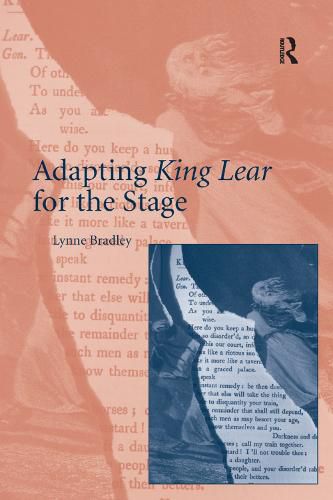Readings Newsletter
Become a Readings Member to make your shopping experience even easier.
Sign in or sign up for free!
You’re not far away from qualifying for FREE standard shipping within Australia
You’ve qualified for FREE standard shipping within Australia
The cart is loading…






Questioning whether the impulse to adapt Shakespeare has changed over time, Lynne Bradley argues for restoring a sense of historicity to the study of adaptation. Bradley compares Nahum Tate’s History of King Lear (1681), adaptations by David Garrick in the mid-eighteenth century, and nineteenth-century Shakespeare burlesques to twentieth-century theatrical rewritings of King Lear, and suggests latter-day adaptations should be viewed as a unique genre that allows playwrights to express modern subject positions with regard to their literary heritage while also participating in broader debates about art and society. In identifying and relocating different adaptive gestures within this historical framework, Bradley explores the link between the critical and the creative in the history of Shakespearean adaptation. Focusing on works such as Gordon Bottomley’s King Lear’s Wife (1913), Edward Bond’s Lear (1971), Howard Barker’s Seven Lears (1989), and the Women’s Theatre Group’s Lear’s Daughters (1987), Bradley theorizes that modern rewritings of Shakespeare constitute a new type of textual interaction based on a simultaneous double-gesture of collaboration and rejection. She suggests that this new interaction provides constituent groups, such as the feminist collective who wrote Lear’s Daughters, a strategy to acknowledge their debt to Shakespeare while writing against the traditional and negative representations of femininity they see reflected in his plays.
$9.00 standard shipping within Australia
FREE standard shipping within Australia for orders over $100.00
Express & International shipping calculated at checkout
Questioning whether the impulse to adapt Shakespeare has changed over time, Lynne Bradley argues for restoring a sense of historicity to the study of adaptation. Bradley compares Nahum Tate’s History of King Lear (1681), adaptations by David Garrick in the mid-eighteenth century, and nineteenth-century Shakespeare burlesques to twentieth-century theatrical rewritings of King Lear, and suggests latter-day adaptations should be viewed as a unique genre that allows playwrights to express modern subject positions with regard to their literary heritage while also participating in broader debates about art and society. In identifying and relocating different adaptive gestures within this historical framework, Bradley explores the link between the critical and the creative in the history of Shakespearean adaptation. Focusing on works such as Gordon Bottomley’s King Lear’s Wife (1913), Edward Bond’s Lear (1971), Howard Barker’s Seven Lears (1989), and the Women’s Theatre Group’s Lear’s Daughters (1987), Bradley theorizes that modern rewritings of Shakespeare constitute a new type of textual interaction based on a simultaneous double-gesture of collaboration and rejection. She suggests that this new interaction provides constituent groups, such as the feminist collective who wrote Lear’s Daughters, a strategy to acknowledge their debt to Shakespeare while writing against the traditional and negative representations of femininity they see reflected in his plays.